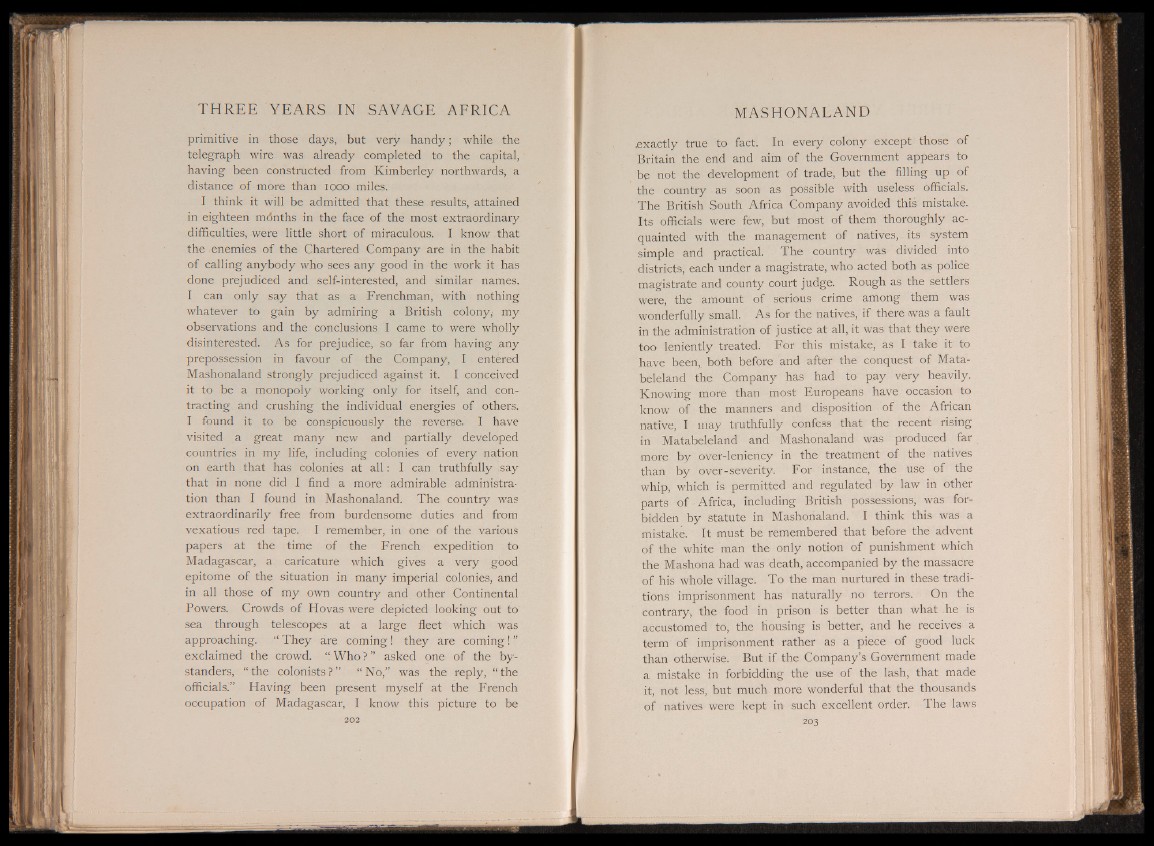
primitive in those days, but very handy ; while the
telegraph wire was already completed to the capital,
having been constructed from Kimberley northwards, a
distance of more than iooo miles.
I think it will be admitted that these results, attained
in eighteen months in the face of the most extraordinary
difficulties, were little short of miraculous. I know that
the enemies of the Chartered Company are in the habit
of calling anybody who sees any good in the work it has
done prejudiced and self-interested, and similar names.
I can only say that as a Frenchman, with nothing
whatever to gain by admiring a British colony,- my
observations and the conclusions I came to were wholly
disinterested. As for prejudice) so far from having any
prepossession in favour of the Company, I entered
Mashonaland strongly prejudiced against it. I conceived
it to be a monopoly working only for itself, and contracting
and crushing the individual energies of others.
I found it to be conspicuously the reverse. I have
visited a great many new and partially developed
countries in my life, including colonies of every nation
on earth that has colonies at all : I can truthfully say
that in none did I find a more admirable administration
than I found in Mashonaland. The country was
extraordinarily free from burdensome duties and from
vexatious red tape. I remember, in one of the various
papers at the time of the French expedition to
Madagascar, a caricature which gives a very good
epitome of the situation in many imperial colonies, and
in all those of my own country and other Continental
Powers. Crowds of Hovas were depicted looking out to
sea through telescopes at a large fleet which was
approaching. “ They are coming ! they are coming ! ”
exclaimed the crowd. “ Who ? ” asked one of the bystanders,
“ the colonists?” “ No,” was the reply, “ the
officials/’ Having been present myself at the French
occupation of Madagascar, I know this picture to be
202
exactly true to fact. In every colony except those of
Britain the end and aim of the Government appears to
be not the development of trade, but the filling up of
the country as soon as possible with useless officials.
The British South Africa Company avoided this mistake.
Its officials were few, but most of them thoroughly acquainted
with the management of natives,. its system
simple and practical. The country was divided into
districts, each under a magistrate, who acted both as police
magistrate and county court judge. Rough as the settlers
were, the amount of serious crime among them was
wonderfully small. As for the natives, if there .was a fault
in the administration of justice at all, it was that they were
too leniently treated. For this mistake, as I take it to
have been, both before and after the conquest of Matabeleland
the Company has had to pay very heavily.
Knowing more than most Europeans have occasion to
know' of the manners and disposition of the African
native, I may truthfully confess that the recent rising
in Matabeleland and Mashonaland was produced far
more by over-leniency in the treatment of the natives
than by over-severity. For instance, the use of the
whip, which is permitted and regulated by law in other
parts of Africa, including British possessions, was forbidden
by statute in Mashonaland. I think this was a
mistake. It must be remembered that before the advent
of the white man the only notion of punishment which
the Mashona had was death, accompanied by the massacre
of his whole village. To the man nurtured in these traditions
imprisonment has naturally no terrors. On the
contrary, the food in prison is better than what he is
accustomed to, the housing is better, and he receives a
term of imprisonment rather as a piece of good luck
than otherwise. But if the Company’s Government made
a mistake in forbidding the use of the lash, that made
it, not less, but much more wonderful that the thousands
of natives were kept in such excellent order. The laws
203